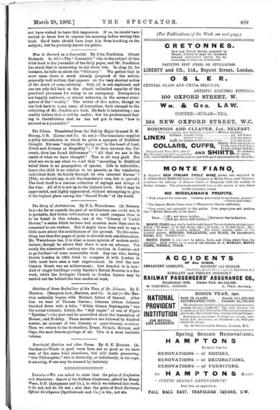The ljdana. Translated from the Pali by Major General D.
M. Strong, C.B. (Luzac and Co. 6s. net.)—The translator supplies a pithy introduction in which he gives a synopsis of Buddhist thought. Nirvana "implies the going out' in the heart of Lust, Illwill and Dulness or Stupidity "; " If thou knowest the Un- create, thou has found deliverance " ; " All that we are is the result of what we have thought." This is all very good. But what are we to say when we read that "according to Buddhist belief there is no propagation of species. Life is indivisible ; hence the child is no relation to its parents, as the wandering individual finds its family through its own inherent Karma" ? (This, we should say, is not the translator's own, but is quoted.) The book itself is a curious collection of sayings and doings of the wise. All of it is not up to the highest level. But it may be appreciated, and highly appreciated, without attempting to give it the highest place among the " Sacred Books " of the world.






































 Previous page
Previous page